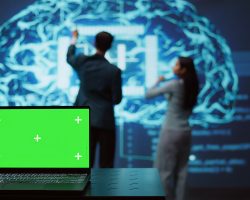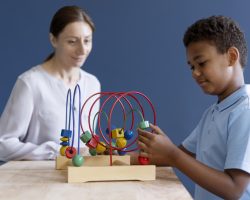Tag Archives: ADHD
Treatment approaches for NVLD and ADHD

Introduction to NVLD and ADHD
Nonverbal Learning Disorder (NVLD) is possibly the most misunderstood and tricky-to-diagnose neurological disorder. Both NVLD and Attention Deficit Hyperactivity Disorder (ADHD) share some symptoms, but they arise from different biological brain-based differences. So, how can you differentiate between the two, and how can you ensure that you or your child receives the correct diagnosis and treatment?
Prevalence of NVLD and ADHD
ADHD is one of the most commonly diagnosed childhood disorders, affecting an estimated 5 to 8 percent of school-age children. In contrast, NVLD is much rarer, with estimates suggesting it affects less than 1 percent of the population. Individuals with both NVLD and ADHD often face challenges with attention, following directions, memory, and executive functioning skills. These difficulties can impact organization, time management, academic performance, social interactions, and daily life.
Key Differences Between NVLD and ADHD
While both disorders can create significant challenges, there are critical differences:
- ADHD Symptoms: Characterized by inattention, hyperactivity, and impulse control issues.
- NVLD Symptoms: Characterized by difficulties with nonverbal communication and visual-spatial skills. Poor visual-spatial skills may lead to problems with math, coordination, balance, and activities like swimming or playing sports.
Individuals with NVLD also struggle to process nonverbal communication cues, such as body language, facial expressions, gestures, sarcasm, tone of voice, and jokes. As a result, they often rely heavily on spoken language, interpreting it literally, which can lead to misunderstandings and perceptions of rigidity in their viewpoints and behaviors.
Diagnosis and Treatment
Because NVLD is not officially recognized in the Diagnostic and Statistical Manual of Mental Disorders (DSM), it is often mistaken for ADHD. If you or your child show signs of either disorder, seeking out a neuropsychologist experienced with NVLD is crucial for obtaining an accurate diagnosis and implementing appropriate treatments.
Treatment Approaches: There is no one-size-fits-all solution for NVLD. While some ADHD interventions may benefit those with NVLD, they are not comprehensive. Treatment options for ADHD often include behavior therapy and medication, whereas NVLD may require a combination of educational, occupational, speech-language, and psychological therapies. These interventions can help individuals learn to manage their challenges, improve functioning, and lead more productive and fulfilling lives.
About Linda Karanzalis
Linda Karanzalis, a Board-Certified Cognitive Specialist, is the author of Misnamed, Misdiagnosed, Misunderstood, a new book on NVLD and other brain-based challenges.
Dr. Ned Hallowell, a renowned psychiatrist and ADHD expert, praises Linda’s work, stating, “Linda’s book is vivid, compelling, full of heart and fresh understanding. Karanzalis replaces suffering with clarity and triumph for the millions of people with NVLD.”
With over 25 years of experience, Linda has worked with individuals of all ages facing NVLD, ADHD, learning disabilities, and those on the autism spectrum. As an author, podcaster, presenter, and ambassador for the NVLD Project, she offers validation, awareness, strategies, and compassion to the millions living with neurodiversity.
Find out more about Linda’s journey and her book at www.lindakaranzalis.com.
Follow Linda Karanzalis through her social media accounts:

Join the NVLD and NeuroDivergent Facebook Support Group
 Linda Karanzalis, MS
Linda Karanzalis, MS
Linda Karanzalis, MS, is a former special education classroom teacher with over 25 years of experience in the areas of learning disabilities, ADHD, social-emotional learning, social skills training, and behavior management
Masking To Fit in a Neurotypical World

Neurotypical vs. Neurodivergent
Neurodiversity and inclusive communication techniques:“Neurotypical” describes an individual with typical neurological development, while “neurodivergent” refers to people with brain-based conditions such as Attention Deficit Hyperactivity Disorder (ADHD), Nonverbal Learning Disorder (NVLD), Autism Spectrum Disorder (ASD), learning disabilities, and mental health conditions. These challenges can make it difficult for neurodivergent individuals to understand what neurotypicals are communicating.
Challenges of Neurodivergent Communication
Many neurotypicals have little understanding or experience interacting with neurodivergent individuals. As a result, they often interpret neurodivergent communication styles as rudeness or character flaws. Some of these behaviors include:
- Poor eye contact
- Interrupting
- Inappropriate laughter
- Speaking too loudly
- Literal interpretation of words
- Repetitive questions
- Invasion of personal space
- Blunt comments
- Tactless jokes
- Rigid thoughts or behaviors
These behaviors are often blamed on poor parenting, with assumptions that parents failed to teach manners or discipline their children.
The Invisible Struggles of Neurodivergent Individuals
If you are neurotypical, you’ve likely encountered frustration when communicating with a neurodivergent person without realizing it. Since there are no visible signs of neurodivergence, you might not have understood their behaviors and communication challenges. Neurodiversity and inclusive communication techniques Had you known, you might have approached the interaction with more patience and understanding.
In an ideal world, both neurotypical and neurodivergent individuals would coexist in a way that respects and accommodates their differences. However, society often expects neurodivergent people to conform to neurotypical norms. This leads to a practice called “masking.”
The Consequences of Masking
Masking is a coping strategy used by neurodivergent individuals to appear neurotypical in social situations, avoiding rejection or bullying. It may involve imitating neurotypical behaviors, suppressing stimming (repetitive movements or sounds), or hiding sensory sensitivities.
While masking can help in certain situations, it is mentally exhausting for neurodivergent individuals who may not fully understand the social behaviors they are imitating. This often leads to increased feelings of loneliness, anxiety, and depression.
Celebrating Neurodiversity
Neurodivergent individuals struggle in environments designed for neurotypicals, but neurodiversity is not something that needs to be “fixed.” It’s about accepting and respecting the natural variation in brain functioning, celebrating strengths, and making room for accommodations.
Strategies for Better Communication
To communicate effectively between neurotypical and neurodivergent individuals, both parties need to be willing to make adjustments. Here are some strategies for bridging the communication gap:
- Use straightforward language: Avoid metaphors, idioms, and sarcasm. Be mindful that not everyone understands nonverbal cues like body language or tone.
- Be patient: Give more time for processing information when needed.
- Acknowledge different communication styles: Listening, taking notes, moving while talking, or using visual aids are ways people understand information differently.
- Avoid sensory overload: Bright lights, loud noises, or strong smells can overwhelm neurodivergent individuals, so try to communicate in calm, quiet environments.
- Be respectful and open-minded: Don’t make assumptions or judgments about someone’s communication style.
- Check for understanding: Periodically ask for clarification to ensure both parties are on the same page.
- Seek feedback: Ask how you can improve communication to better accommodate the other person.
Creating an Inclusive Society
Greater awareness and understanding of neurodivergence are essential for creating a more harmonious and inclusive society. Events like Neurodiversity Celebration Week (March 13-19, 2023) are a great starting point for raising awareness. Founded by Siena Castellon, an autistic teenager with ADHD, dyslexia, and dyspraxia, Neurodiversity Celebration Week aims to change the narrative around neurodiversity by highlighting strengths as well as challenges.
About Linda Karanzalis
Linda Karanzalis, a Board-Certified Cognitive Specialist and the author of Misnamed, Misdiagnosed, Misunderstood, has been an advocate for neurodivergent individuals for over 25 years. As someone with NVLD and ADHD, Linda understands the struggles firsthand. She has dedicated her life to helping individuals with NVLD, ADHD, learning disabilities, and those on the autism spectrum.
Dr. Ned Hallowell, a psychiatrist and world-renowned ADHD expert, praises Linda’s work, saying: “Linda’s book is vivid, compelling, full of heart and fresh understanding. Karanzalis replaces suffering with clarity and triumph for the millions of people with NVLD.”
Learn more about Linda’s work and her book at www.lindakaranzalis.com.
Follow Linda Karanzalis through her social media accounts:

Join the NVLD and NeuroDivergent Facebook Support Group
 Linda Karanzalis, MS
Linda Karanzalis, MS
Linda Karanzalis, MS, is a former special education classroom teacher with over 25 years of experience in the areas of learning disabilities, ADHD, social-emotional learning, social skills training, and behavior management
Neurodiversity: Join the Movement!
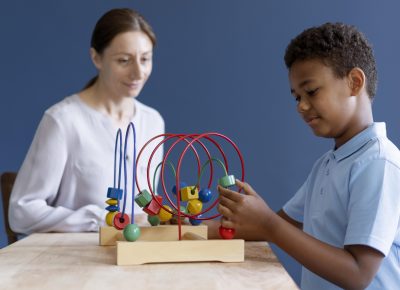
What is Neurodiversity?
Neurodiversity and mental health is a concept that celebrates neurological differences as natural variations in the human population. Literally, neurodiversity means “differently wired.” This term reflects the brain-based differences that make neurodivergent people think, learn, behave, and work differently from the majority of the population, known as “neurotypicals.”
Key Differences Between Neurotypicals and Neurodivergent Individuals
Neurodivergent individuals may have conditions such as Autism Spectrum Disorder (ASD), Attention Deficit Hyperactivity Disorder (ADHD), dyslexia, dyscalculia, dyspraxia, Nonverbal Learning Disorder (NVLD), language processing disorder, and auditory processing disorder. They may also struggle with challenges related to executive functioning, socialization, communication, and visual/spatial processing. Additionally, some neurodiverse individuals deal with epilepsy, Tourette’s syndrome, and mental health issues like depression, anxiety, and bipolar disorder.
Misunderstandings and Discrimination
Neurotypical individuals often have expectations about how others should behave and function. When these expectations are not met, neurodiverse individuals may be misunderstood and labeled as lazy or unmotivated, leading to discrimination. For instance, an autistic person might struggle with making eye contact or interpreting social cues, which can be wrongly perceived as rudeness or disinterest.
The Origins of Neurodiversity
The term “neurodiversity” was coined by Judith Singer, an Australian sociologist with autism, in a 1998 thesis paper. Singer compared the oppression of neurodiverse individuals to the historical marginalization of women, LGBTQ people, and nonwhite ethnic minorities. Her work sparked the Neurodiversity and mental health acceptance movement, which advocates for embracing individuals’ unique attributes rather than expecting them to conform to societal norms.
Complementary Cognition and Problem-Solving
Helen Taylor, Research Director at the Human Centre for Entrepreneurship at the University of Strathclyde, expanded on Singer’s work by introducing the concept of complementary cognition. Taylor’s research suggests that human brains have evolved to develop various skills that, when combined through collaboration, lead to better problem-solving outcomes. Her hypothesis is supported by cognitive psychology, neuroscience, and evolutionary research.
Benefits of Recognizing Neurodiversity
Recognizing and embracing neurodiversity reduces the stigma, rejection, isolation, and discrimination experienced by many Neurodiversity and mental health individuals. As neurodiverse individuals feel more accepted, their levels of anxiety, shame, and low self-esteem decrease. By viewing neurological differences as normal rather than abnormal, we acknowledge that neurodivergent individuals can be just as intelligent and capable as neurotypicals.
Contributions of Neurodivergent Individuals
Many neurodiverse individuals have been misunderstood and excluded from classrooms, sports, and jobs. Yet, their unique abilities, such as out-of-the-box thinking and innovative problem-solving, can greatly benefit society. For example, people with autism often possess exceptional attention to detail, visual thinking abilities, and logical reasoning, making them well-suited for careers in science, technology, and the arts. Famous inventors, scientists, and artists believed to have been neurodivergent include Albert Einstein, Nikola Tesla, and Emily Dickinson.
Accommodations for Neurodivergent Individuals
Changes in education and employment law have paved the way for accommodations, allowing neurodivergent individuals to access the same opportunities as others. These accommodations are tools that level the playing field, not special privileges. Cultural shifts are also evident in the increasing representation of neurodiverse characters in books, films, and television.
The Importance of Teaching Neurodiversity to Children
As a society, we must continue to promote the acceptance of neurodiversity. Teaching children to work collaboratively, respecting each other’s strengths, will prepare them to thrive in a neurodiverse world. By offering each child the opportunity to contribute, we can create better outcomes for everyone.
Neurodiversity Celebration Week
A great way to begin embracing neurodiversity is through Neurodiversity Celebration Week, held from March 13th to 19th. This year’s event features 24 separate activities, including panel discussions and webinars on topics such as language, culture, design tech, and justice-related issues.
Learn More About Neurodiversity
For more information on neurodiversity, check out my new book, Misnamed, Misdiagnosed, Misunderstood.
About Linda Karanzalis
Linda Karanzalis, a Board-Certified Cognitive Specialist, is the author of Misnamed, Misdiagnosed, Misunderstood, a new book on Nonverbal Learning Disorder and other brain-based challenges.
Dr. Ned Hallowell, a psychiatrist and world-renowned ADHD expert, praises Linda’s work:
“Linda’s book is vivid, compelling, full of heart and fresh understanding. Karanzalis replaces suffering with clarity and triumph for the millions of people with NVLD.”
Linda, who has NVLD and ADHD herself, has worked for more than 25 years with individuals of all ages who have NVLD, ADHD, learning disabilities, and those on the autistic spectrum. As an author, podcaster, presenter, learning specialist, and ambassador for the NVLD Project, she provides validation, awareness, solutions, strategies, and, most importantly, compassion to the millions who live with neurodiversity.
Find out more about her story and book at www.lindakaranzalis.com.
Follow Linda Karanzalis through her social media accounts:

Join the NVLD and NeuroDivergent Facebook Support Group
 Linda Karanzalis, MS
Linda Karanzalis, MS
Linda Karanzalis, MS, is a former special education classroom teacher with over 25 years of experience in the areas of learning disabilities, ADHD, social-emotional learning, social skills training, and behavior management
School Daze How I Graduated College With Honors

For students with brain-based learning challenges like ADHD and NVLD, excelling in school can be an enormous challenge. I want to share with you some of the tips and tricks I used to graduate with honors to become to get a master’s degree in brain-based education.
Find the Best Instructors for Your Learning Style
An instructor can make or break your success. First, try to determine if the instructor is open to students with learning disabilities and understands their needs for accommodations, such as additional time to take tests. Some professors who “don’t believe” in accommodations will shame students who ask for them in front of their classmates.
It was crucial for me to have professors who were passionate about their subject and skilled in their delivery of course content and materials. I made it my business to talk to other students about the instructors they had in the classes I needed to take. I wanted to know about the instructor’s grading system: do they give pop quizzes? Base tests on class notes or textbooks? Expect frequent participation in class? Assign group projects?
Pace Yourself
Instead of taking five classes a semester, like most of my peers, I took four to reduce stress and to give me the extra time I needed to focus and determine my own pace. I also took one course each summer. When I had courses that were difficult for me, I took them along with less demanding electives to allow me to focus better on the more strenuous classes.
Grade Point Average (GPA) and the Pass/Fail Option
It was important to me to have a high GPA so I chose the pass/fail option for math classes whenever I could. Instead of getting a grade for the class, you pass the course with a grade of D or higher without affecting your GPA. However, if you don’t pass, your GPA will be affected by having a zero added to it.
Dropping Classes
The add/drop process allows you to withdraw after the class starts as long as you meet the cutoff date. This gave me enough time to see how I was doing in class. If I was heading toward failure, I would withdraw. It wouldn’t count toward my GPA and appeared as a W, for withdrawal, on my transcript.
Early-Morning Classes
I had a terrible time getting up, and I hated taking early-morning classes. People with ADHD often have interrupted sleep patterns, and it takes longer for their brains to wake up. NVLDers and NDs have a higher rate of depression, which also makes getting up and out of bed difficult.
To work around this, I enrolled in as few morning classes as possible, but there were classes I needed that were only offered in the early mornings. To get to 8:00 a.m. classes, I set my alarm for 6:00 a.m. and immediately guzzled a bottle of caffeinated iced tea that I had put next to my bed the previous evening. I took my shower the night before and—get ready for this; it’s a doozy— I slept in the clothes I would wear the next day. I know, crazy, right? I wore a clean T-shirt and leggings to bed. In the morning, I’d put on my socks and sneakers and a head- band. Finally, I would grab my book bag and energy bar and head off to class looking like I had just come from the gym!
Note-Taking
I created blank outline forms to use during class lectures. Filling in the blanks helped me to structure and organize topics with supporting details. Otherwise, I’d try to write down everything the instructor said, and I’d wind up with a bunch of notes looking like “chicken scratch.”
Recording Class Lectures
Some instructors allowed me to record class lectures. Find out if there is a schoolwide policy about recording lectures or if it is up to the individual instructors.
There are, of course, dozens more strategies, tactics, software, and apps that can help students, and I will share some more of my own in another post.
This column is an excerpt from Misnamed, Misdiagnosed, Misunderstood, my new book. If you want to learn more about the secrets to my college success, click here. Or check out my blog here.
#nvld #nonverballearningdisorder #nonverballearningdisability #learningdisabilities #aspergers #neurodivergent #autism #adhd #neurodiversity #anxiety #inclusion #adhdawareness #specialneeds #adhdsupport #adhdwomen #adhdmom
Linda Karanzalis, Board-Certified Cognitive Specialist is the author of Misnamed, Misdiagnosed, Misunderstood, a new book on Nonverbal Learning Disorder and other brain-based challenges.
Dr. Ned Hallowell, a psychiatrist, world-renowned expert on ADHD, and the New York Times best-selling author of Driven to Distraction says, “Linda’s book is vivid, compelling, full of heart and fresh understanding. Karanzalis replaces suffering with clarity and triumph for the millions of people with NVLD.”
Linda, who has NVLD and ADHD, has worked for more than 25 years with individuals of all ages with NVLD, ADHD, learning disabilities, and those on the autistic spectrum. As an author, podcaster, presenter, learning specialist, and ambassador for the NVLD Project, she provides validation, awareness, solutions, strategies, and, most importantly, compassion to the millions who live with neurodiversity. Find out more about her story and book at www.lindakaranzalis.com.
Follow Linda Karanzalis through her social media accounts:

Join the NVLD and NeuroDivergent Facebook Support Group
 Linda Karanzalis, MS
Linda Karanzalis, MS
Linda Karanzalis, MS, is a former special education classroom teacher with over 25 years of experience in the areas of learning disabilities, ADHD, social-emotional learning, social skills training, and behavior management
Misnamed, Misdiagnosed, Misunderstood: Award Winning Book on Neurodiversity (Covering ADHD, NVLD, Spectrum Disorders) Endorsed by New York Times Bestselling Author Dr. Ned Hallowell

I am thrilled to introduce you to my book, “Misnamed, Misdiagnosed, Misunderstood,” a deeply personal exploration of NVLD, ADHD, and its profound impact on the lives of neurodivergent individuals like myself. My perspective is unique as a neurodivergent board- certified cognitive specialist working in the field. In a world where labels define us, where diagnoses shape our identity, and where understanding often falls short, there lies a profound need for empathy, knowledge, and compassion.
As someone who has experienced the challenges and triumphs of navigating a neurodivergent journey, I wrote this book to shed light not only on the little- known disorder NVLD, but for all those who think, learn, and do things differently (neurodivergents) with a variety of diagnoses. Although the causes of NVLD, ADHD, and spectrum disorders are different, typically there is an overlap of shared symptoms and strengths that go unnoticed in a society that values conformity.
In this book I take you beyond the surface-level understanding of these conditions, delving into the intricate web of symptoms, behaviors, vulnerabilities, work arounds, and treatments. You’ll peek firsthand into the overshadowed lives of those who have been marginalized due to their neurodivergent traits. Stereotypes are dismantled through a tapestry of narratives, intertwining personal and professional anecdotes, scientific research, and practical advice.
Be prepared to meet some remarkable individuals who have defied the limitations of their diagnoses by carving their own paths unique toward resilience, growth, and having a life worth living.
My hope is that this book will serve as a guiding light for neurodivergent individuals of all ages, providing validation, understanding, self-acceptance, and the tools to move forward in their lives. A resource for parents, families, friends, educators, helping professionals, employers, and the wider community. Recognizing that true understanding can only arise from learning, listening to others, and acknowledging the inherent worth of every individual.
Fostering a more inclusive society that embraces neurodiversity will not only empower neurodivergent individuals to thrive, but will also enrich our collective understanding of what it truly means to be human. May the pages of this book ignite conversations, inspire empathy, and pave the way for a future where the beauty of neurodiversity is celebrated.
I am immensely proud to share that “Misnamed, Misdiagnosed, Misunderstood” has received acclaim from Dr. Ned Hallowell, a distinguished psychiatrist and New York Times bestselling author. Additionally, the book has received the prestigious Mom’s Choice Award in recognition of its exceptional contribution to the field of neurodiversity. Earning the Mom’s Choice Award is a significant accomplishment. It represents a mark of excellence, indicating that the recipient has surpassed rigorous evaluations conducted by a panel of judges consisting of industry professionals, parents, and educators.
These endorsements further highlight the relevance and importance of this work.
‘Vivid, compelling, poignant, full of heart and fresh understanding. But also full of current science and all the evidence any novitiate might need. Karanzalis is fervent in her desire to replace suffering, misunderstanding, and frustration with triumph, clarity, and sweet success for the mil lions of people who have NVLD as well as those who care about them.’
Dr. Edward Hallowell
Psychiatrist, New York Times Bestselling Author of Driven to Distraction
© ADDvantages Learning Center, LLC 2023
#nvld #nonverballearningdisorder #nonverballearningdisability #learningdisabilities #aspergers #neurodivergent #autism #adhd #neurodiversity #anxiety #inclusion #adhdawareness #specialneeds #adhdsupport #adhdwomen #adhdmom
Linda Karanzalis, Board-Certified Cognitive Specialist is the author of Misnamed, Misdiagnosed, Misunderstood, a new book on Nonverbal Learning Disorder and other brain-based challenges.
Dr. Ned Hallowell, a psychiatrist, a world-renowned expert on ADHD, and the New York Times best-selling author of Driven to Distraction says, “Linda’s book is vivid, compelling, full of heart and fresh understanding. Karanzalis replaces suffering with clarity and triumph for the millions of people with NVLD.”
Linda, who has NVLD and ADHD, has worked for more than 25 years with individuals of all ages with NVLD, ADHD, learning disabilities, and those on the autistic spectrum. As an author, podcaster, presenter, learning specialist, and ambassador for the NVLD Project, she provides validation, awareness, solutions, strategies, and, most importantly, compassion to the millions who live with neurodiversity. Find out more about her story and book at www.lindakaranzalis.com.
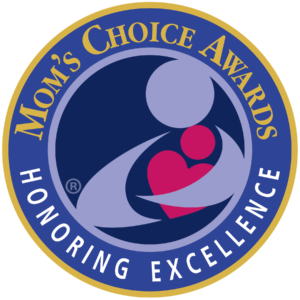
Follow Linda Karanzalis through her social media accounts:

Join the NVLD and NeuroDivergent Facebook Support Group
 Linda Karanzalis, MS
Linda Karanzalis, MS
Linda Karanzalis, MS, is a former special education classroom teacher with over 25 years of experience in the areas of learning disabilities, ADHD, social-emotional learning, social skills training, and behavior management
Empowering NeuroDivergence With Pioneer Linda Karanzalis, MS, BCCS Message to the World

NTERVIEW ON THE PRICE OF BUSINESS SHOW, MEDIA PARTNER OF THIS SITE.
Recently Kevin Price, Host of the nationally syndicated Price of Business Show, welcomed NVLD and Neurodivergent Expert Linda Karanzalis, MS, BCCS to provide another commentary in a series.

The Linda Karanzalis Commentaries
In a world where NeuroDiversity is gaining recognition and understanding, Linda Karanzalis stands out as a beacon of empowerment and change. Through her efforts, she has raised awareness, promoted understanding, and advocated for including those who “think, learn, and do things differently” than most of the population.
Linda, a neurodivergent educational professional, recently received the prestigious Harrison Sylvester Award from the Learning Disabilities of America. This award recognizes her exceptional contributions to the neurodivergent community for individuals with ADHD, learning disabilities, including NVLD, those on the spectrum, and
Linda’s expertise is encapsulated in her book Misnamed, Misdiagnosed, Misunderstood: Recognizing and Coping with NVLD and other conditions. Dr. Ned Hallowell, a distinguished authority in ADHD, and other leading professionals and researchers from Columbia University have endorsed her book. This book provides invaluable insights, treatments, practical strategies, and resources for individual families and helps professionals navigate the challenges and successes of neurodivergent individuals.
In her acceptance speech, Linda shares her wealth of knowledge and experience, emphasizing the importance of compassion and understanding before interventions can be effective.
Her dedication, expertise, care, and concern make her a trusted advocate and resource for the neurodivergent community.
Watch or listen to her inspiring acceptance speech
Learn more about Linda and her work at www.addvantageslearningcenter.com
Linda Karanzalis, Board-Certified Cognitive Specialist is the author of Misnamed, Misdiagnosed, Misunderstood, a new book on Nonverbal Learning Disorder and other brain-based challenges.
Dr. Ned Hallowell, a psychiatrist, world-renowned expert on ADHD, and the New York Times best-selling author of Driven to Distraction says, “Linda’s book is vivid, compelling, full of heart and fresh understanding. Karanzalis replaces suffering with clarity and triumph for the millions of people with NVLD.”
Linda, who has NVLD and ADHD, has worked for more than 25 years with individuals of all ages with NVLD, ADHD, learning disabilities, and those on the autistic spectrum. As an author, podcaster, presenter, learning specialist, and ambassador for the NVLD Project, she provides validation, awareness, solutions, strategies, and, most importantly, compassion to the millions who live with neurodiversity. Find out more about her story and book at www.lindakaranzalis.com.
Follow Linda Karanzalis through her social media accounts:

Join the NVLD and NeuroDivergent Facebook Support Group
For more great health and lifestyle content see here.
LISTEN TO THE INTERVIEW IN ITS ENTIRETY HERE:
 Linda Karanzalis, MS
Linda Karanzalis, MS
Linda Karanzalis, MS, is a former special education classroom teacher with over 25 years of experience in the areas of learning disabilities, ADHD, social-emotional learning, social skills training, and behavior management
How Can I Get My ADHD Child to Clean His Room?
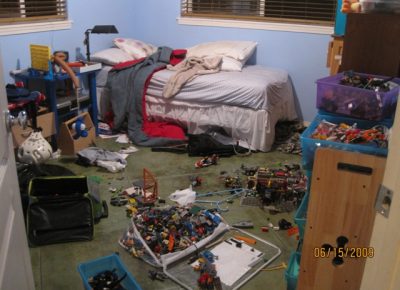
Q. I was wondering if anyone has any tips or tricks for getting my 7 year old son to clean his room or clean up after himself. I pretty much just clean his room myself because telling him to clean his room is a SURE FIRE trigger to a major melt down (on meds or not) and since he shares a room with his younger brother it is fair that he never has to clean up after himself. I have just always done it to avoid the meltdown which always leads to my own melt down!
A. Children with attention deficit disorder (ADHD) need lots of structure and strategies to accomplish tasks that may seem ‘easy’ or ‘common sense’ to others. Many children with ADHD often ‘shut down’ when overwhelmed and often ‘act out’ when confronted with meeting parental expectations, like cleaning their room, as they have no idea how to start and finish. By cleaning his room for him to avoid a meltdown you are actually reinforcing and rewarding your child for inappropriate behaviors. Of course this is not your intention, but the cost of ‘keeping the peace’ backfires in the long run. It is better to be prepared to endure the ‘meltdown burst’ to teach your child life-long skills to manage himself and the expectations of others towards becoming an independent adult.
No worries, your child can learn how to clean his room with consistent practice. First you need to define what ‘cleaning your room’ means to your child. Break down what is to be done in order by creating a list on poster board and placing in his room. Laminate the poster board so your child can use a wipe off marker after he completes each step. Practice with your child by showing him how to do for each item on the list. For example, if you want him to put his clothes in the laundry place two baskets in his room. He will put all the whites in the white basket and the darks in the dark basket. If you would like him to pick up his shoes place a plastic shoe holder that is hung over his bedroom door to put them in. Assess your child’s belongings and provide a ‘home’ for them his room. One child I worked with loved baseball cards, he knew exactly where they were, strewn all over his bedroom floor! I worked with his mother to devise a system of placing them in plastic card holders and organizing them in binders by leagues, teams, hall of famers, and positions. The child was proud of ability to manage his cards as was his mother. Break down each task and practice with your child until he masters each one independently, and the next time you say ‘clean your room’ your child will know exactly what to do!
To set up a system for chores read my article exclusive web article on at
http://www.additudemag.com/adhd-web/article/9110-5.html
ADHD CHADD Conference Highlights
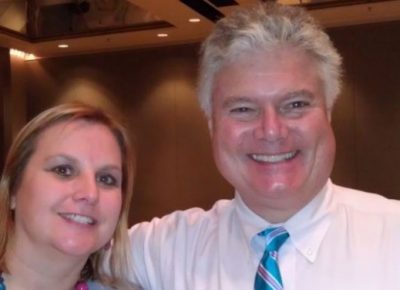
Lunch with Dr. Ned Hallowell, author of Driven to DistractionLunch with Dr. Ned Hallowell, author of Driven to DistractionAs the coordinator of CHADD of SJ Chapter I attend the conference each year and return inspired from my experience and participation. This year I had the opportunity to have lunch with Dr. Ned Hallowel, author of ‘Driven to Distraction.” Dr. Hallowell is a international expert in the field of ADHD. Dr. Hallowell graciously shared his in-depth knowledge and talked about how he is in the business of unwrapping the gifts of ADHD. He noted ADHD is not a gift but people with ADHD have gifts just like others do without ADHD.
Highlights of CHADD Conference
Theme:
Creating Better Tomorrows moving forward to help those impacted by ADHD and surrounding issues.
Opening Keynote:
Timothy Wilens, MD, Harvard Medical School discussed the challenges of youth with ADHD, ages 15 -26, and brain growth during these years based on a study of young adults. The study indicated the frontal lobes of the brain showed large changes up to the age of 30, this is great news! Parents, in time your children will develop ‘executive functioning skills’ which are crucial to life success and independence. As your child continues to develop and move through this phase there is an increase of risk taking behaviors and substance abuse. However, with the proper medication, coaching, and treatment these behaviors can be decreased with ongoing support.
Alarm Clocks for Kids with ADHD/ADD Children who Have Difficulty Waking Up

Many children with ADHD/ADD have difficulty getting up in the morning. Many parents are at their wit’s end trying to get their children up and to school on time. This is due to the fact many with ADHD/ADD have hypersomnia caused by the difficulty with the brains ability to shifting from the sleep state to the awake state. A few of my favorite helpful alarm clocks are as follows:
Puzzle Alarm Clock
This clocks wakes children up by firing four puzzle pieces in the air. The child must put them back in the alarm clock to turn it off, requiring physical activity is the key to get kids up and moving. You can purchase this at gizmodo.com
KuKu Alarm Clock
This clock crows and lays eggs. It won’t stop chirping until you’ve returned the eggs . To view this alarm and more go to uberreview.com
What are your Strategies for Getting Your Child Up in the Morning?
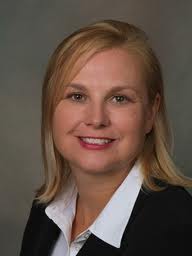 Linda Karanzalis, M.S., is an adult with ADD/ADHD, a learning specialist, the founder of ADDvantages Learning Center, and an ADD/ADHD coach who specializes in helping both children and adults with ADD/ADHD and learning disabilities to reach their potential.You have permission to republish this article as long as it retains this information box and the link.
Linda Karanzalis, M.S., is an adult with ADD/ADHD, a learning specialist, the founder of ADDvantages Learning Center, and an ADD/ADHD coach who specializes in helping both children and adults with ADD/ADHD and learning disabilities to reach their potential.You have permission to republish this article as long as it retains this information box and the link.
LIndaKaranzalis©2011








